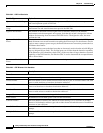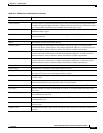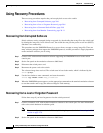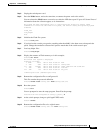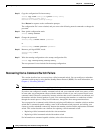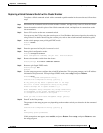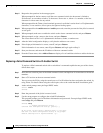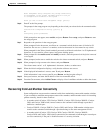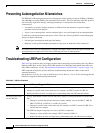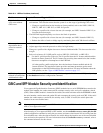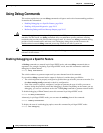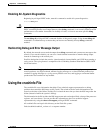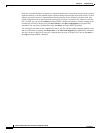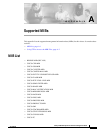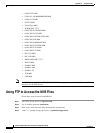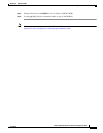
28-12
Catalyst 2950 Desktop Switch Software Configuration Guide
78-14982-01
Chapter28 Troubleshooting
Preventing Autonegotiation Mismatches
Preventing Autonegotiation Mismatches
The IEEE 802.3AB autonegotiation protocol manages the switch settings for speed (10 Mbps, 100 Mbps,
and 1000 Mbps excluding GBIC ports) and duplex (half or full). There are situations when this protocol
can incorrectly align these settings, reducing performance. A mismatch occurs under these
circumstances:
• A manually-set speed or duplex parameter is different from the manually set speed or duplex
parameter on the connected port.
• A port is set to autonegotiate, and the connected port is set to full duplex with no autonegotiation.
To maximize switch performance and ensure a link, follow one of these guidelines when changing the
settings for duplex and speed:
• Let both ports autonegotiate both speed and duplex.
• Manually set the speed and duplex parameters for the ports on both ends of the connection.
Note If a remote device does not autonegotiate, configure the duplex settings on the two ports to match. The
speed parameter can adjust itself even if the connected port does not autonegotiate.
Troubleshooting LRE Port Configuration
Table 28-4 lists problems that you might encounter when configuring and monitoring the Long-Reach
Ethernet (LRE) ports on the Catalyst 2950 LRE switches. For additional information about what can
affect LRE connections, see the “Environmental Considerations for LRE Links” section on page 7-18.
LRE command descriptions provide additional troubleshooting information. Refer to the switch
command reference.
See the Release Notes for the Catalyst 2950 Desktop Switch, Release 12.1(11)YJ for switch upgrade and
CPE device upgrade troubleshooting information.
Table 28-4 LRE Port Problems
Problem Suspected Cause and Suggested Solution
Amber LRE port LED The switch and CPE device are unable to establish an LRE link using the selected profile.
• Change to a profile with a lower data rate (for example, use LRE-5 instead of LRE-15).
• Reduce the effect of stubs or bridge taps by terminating them with 300-ohm microfilters.
Excessive CRC errors
on an LRE link
• A noisy environment (such as motors and power surges) is causing interference with the LRE
link.
–
Change to a profile that has the interleaver feature enabled, such as the LRE-5, LRE-10,
LRE-15, LRE-10-1, LRE-10-3, or LRE-10-5 profile.
–
Change to a profile with a lower data rate (for example, use LRE-5 instead of LRE-15) to
increase the noise margin.
• The LRE link length and quality are close to the limit of operation.
–
Change to a lower profile (for example, LRE-5 instead of LRE-15).
–
Reduce the effect of stubs or bridge taps by terminating them with 300-ohm microfilters.



